I’m from Ovens, Co Cork. That’s where our farm is. Cork Christmas Trees, we’re a family business.
We started in forestry about 25 years ago and we got into Christmas trees nearly 20 years ago now.
My father would have started out in forestry. We have forestry up on Shehy More Mountain in west Cork.
We actually have Christmas trees up there as well, growing at 1,200ft. Christmas trees grow bushier at a higher altitude.
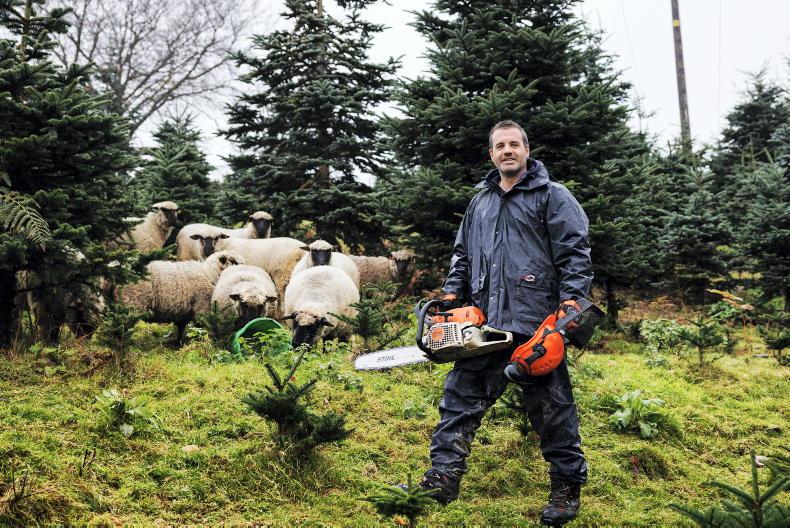
Fintan Riordan also has a flock of Shropshire sheep. \ Donal O'Leary
We’ve 20ac of Christmas trees in Ovens and we’ve another 10ac planted on Shehy More. There’s another 360ac of forestry on Shehy More as well.
We sell Christmas trees on a choose-and-cut basis at the farm and then in the city as well. Our main location that we’ve had for a long while now is on Centre Park Road in the Cork docklands.
We also supply hotels up the country and event companies. Some of them might want big 30ft trees. We do some wholesale as well, but the bulk of our business is retail.
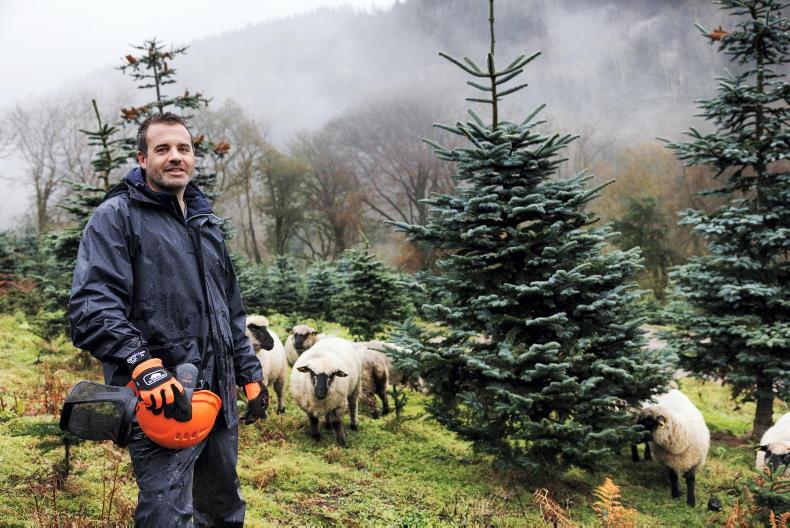
Fintan says that Christmas trees are a very efficient way to sequester CO2. \ Donal O'Leary
A lot has changed since we started growing Christmas trees. Standards have improved and the way we farm as well has completely changed in the last two or three years.
We don’t spray herbicides anymore. To prove that we’re organic Christmas tree farmers there’s grass growing between our trees. We have Shropshire sheep that graze there. They eat all the weeds and the grass.
Christmas trees are very sustainable. It’s not that you’re wiping out the whole crop and they’re not sequestering CO2 anymore. The crop is constantly sequestering CO2. Our Christmas trees and forestry combined sequester over 1,000t of CO2 every year.
Varieties
We grow Noble Fir, Normand Fir, Korean Fir and Frazer Fir. The Noble Fir is the most popular in Cork. They’re the best for the Christmas tree scent. They have a very strong pine scent.
The Normand Fir would be the most widely grown in general. They’re easier to grow, so if they’re easier to grow they become bushier and more appealing.
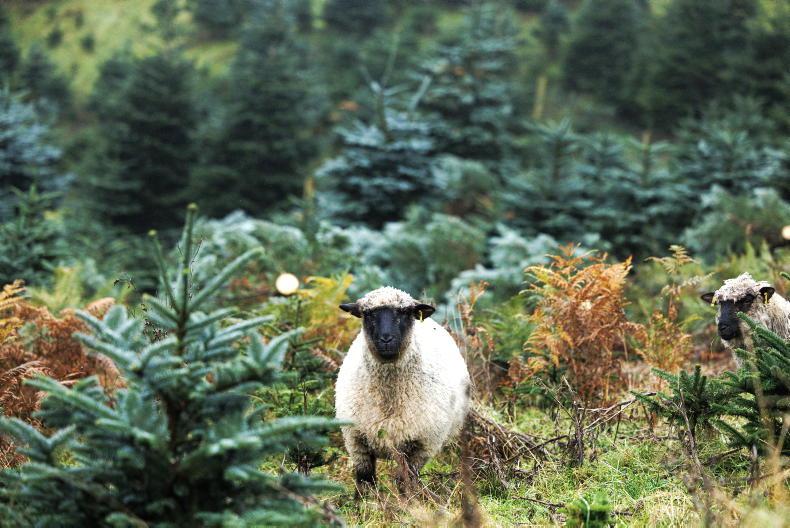
The Shropshire flock grazes the mountain area around the Christmas trees. \ Donal O'Leary
Take Noble Fir for example, some growers wouldn’t grow them because you could have a beautiful crop for eight years and next thing every one of them is gone. They’re very finicky tress that don’t tolerate certain soil types.
They need sloped ground, we’ve got that. They’re core ground is peaty ground. Noble Fir like high altitude as well, so they’re thriving up on the mountain because of the high altitude in west Cork.
If you had tillage ground you might think you’d grow the best trees, but actually what would happen is they would be like twigs, because they would grow too fast. If your soil is too heavy they’ll grow too slow and they’d be way too wide. It’s trying to get the right balance.
With Christmas trees it’s not just a case of planting them and waiting for them to grow. It takes eight years from planting to get a six foot tree.
Then there’s a whole other bunch of tasks you have to do, wood picking, pruning, fertilising. To get that triangle shape, you have to prune each tree manually with a hedge clippers.
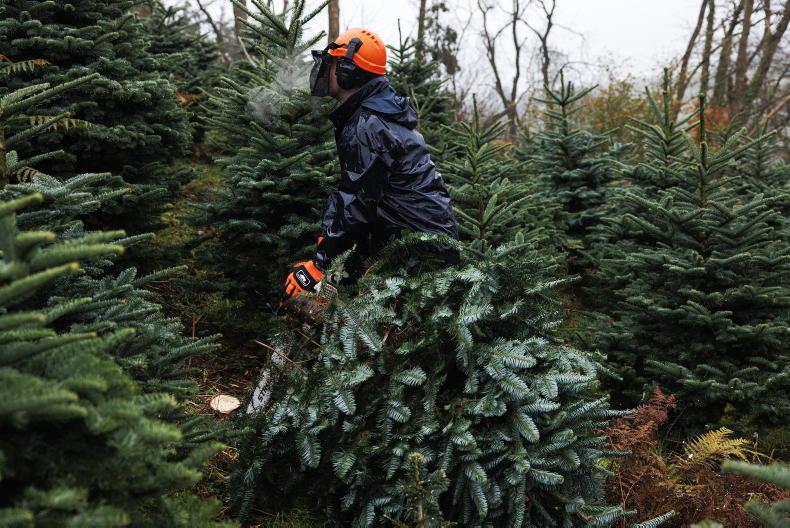
There is a lot of manual labour involved in growing Christmas trees. \ Donal O'Leary
Physical
Christmas tree growing, it’s a mixture of farming, horticulture and forestry. There’s a lot of manual work all year round.
Come the harvest it’s very high pressure, because for us the retail in the city opens from nine in the morning to eight in the evening. We only cut what we sell, so I’ve to harvest trees very early in the morning from six o’clock and also harvest trees at night time under lights. 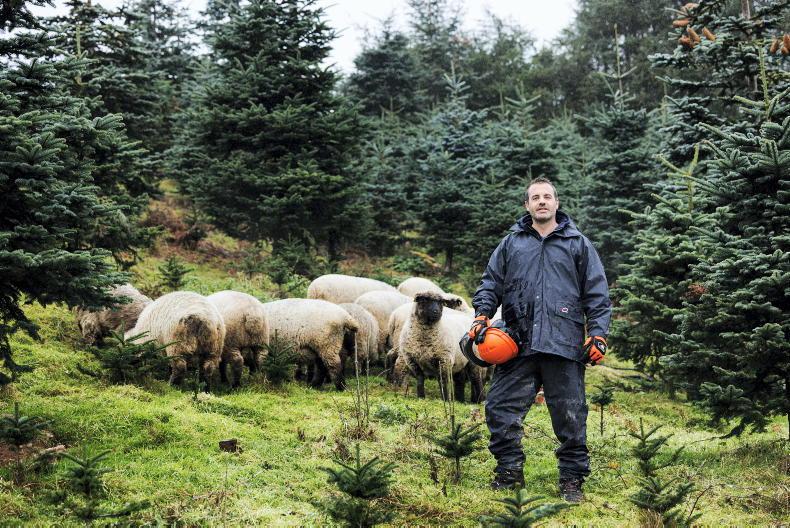
We have to set up the trees in the retail then. We stand up our trees, to give a kind of forest effect. So there’s a lot of work in that as well.
It’s quite high pressure and it’s very, very physical; filling a trailer and then lifting big trees as well. For me it’s like carrying a Christmas tree around with me all day long, because you’re constantly loading a tree.
I’ll put it this way, I lose about six kilos in six weeks coming up to Christmas. That’s not an over exaggeration. It’s like a bootcamp really.
We’d even sell trees up to Christmas Eve. I’d have people ring me for a tree. I won’t be doing that this year though because we’ve a baby now, our daughter is 18 weeks old.
My brothers are involved in the business as well, so I think what we’ll do is, we’ll just have the farm open Christmas Eve, flip a coin and one of the brothers can be there to sell a few trees.
We put up our own tree around 8-10 December. You don’t want to put it up too early, but you also don’t want to put it up too late.
Read more
ICL Podcast #44: the west's awake in Sligo
During COVID, Wild Catering has established itself in the West of Ireland
I’m from Ovens, Co Cork. That’s where our farm is. Cork Christmas Trees, we’re a family business.
We started in forestry about 25 years ago and we got into Christmas trees nearly 20 years ago now.
My father would have started out in forestry. We have forestry up on Shehy More Mountain in west Cork.
We actually have Christmas trees up there as well, growing at 1,200ft. Christmas trees grow bushier at a higher altitude.

Fintan Riordan also has a flock of Shropshire sheep. \ Donal O'Leary
We’ve 20ac of Christmas trees in Ovens and we’ve another 10ac planted on Shehy More. There’s another 360ac of forestry on Shehy More as well.
We sell Christmas trees on a choose-and-cut basis at the farm and then in the city as well. Our main location that we’ve had for a long while now is on Centre Park Road in the Cork docklands.
We also supply hotels up the country and event companies. Some of them might want big 30ft trees. We do some wholesale as well, but the bulk of our business is retail.

Fintan says that Christmas trees are a very efficient way to sequester CO2. \ Donal O'Leary
A lot has changed since we started growing Christmas trees. Standards have improved and the way we farm as well has completely changed in the last two or three years.
We don’t spray herbicides anymore. To prove that we’re organic Christmas tree farmers there’s grass growing between our trees. We have Shropshire sheep that graze there. They eat all the weeds and the grass.
Christmas trees are very sustainable. It’s not that you’re wiping out the whole crop and they’re not sequestering CO2 anymore. The crop is constantly sequestering CO2. Our Christmas trees and forestry combined sequester over 1,000t of CO2 every year.
Varieties
We grow Noble Fir, Normand Fir, Korean Fir and Frazer Fir. The Noble Fir is the most popular in Cork. They’re the best for the Christmas tree scent. They have a very strong pine scent.
The Normand Fir would be the most widely grown in general. They’re easier to grow, so if they’re easier to grow they become bushier and more appealing.

The Shropshire flock grazes the mountain area around the Christmas trees. \ Donal O'Leary
Take Noble Fir for example, some growers wouldn’t grow them because you could have a beautiful crop for eight years and next thing every one of them is gone. They’re very finicky tress that don’t tolerate certain soil types.
They need sloped ground, we’ve got that. They’re core ground is peaty ground. Noble Fir like high altitude as well, so they’re thriving up on the mountain because of the high altitude in west Cork.
If you had tillage ground you might think you’d grow the best trees, but actually what would happen is they would be like twigs, because they would grow too fast. If your soil is too heavy they’ll grow too slow and they’d be way too wide. It’s trying to get the right balance.
With Christmas trees it’s not just a case of planting them and waiting for them to grow. It takes eight years from planting to get a six foot tree.
Then there’s a whole other bunch of tasks you have to do, wood picking, pruning, fertilising. To get that triangle shape, you have to prune each tree manually with a hedge clippers.

There is a lot of manual labour involved in growing Christmas trees. \ Donal O'Leary
Physical
Christmas tree growing, it’s a mixture of farming, horticulture and forestry. There’s a lot of manual work all year round.
Come the harvest it’s very high pressure, because for us the retail in the city opens from nine in the morning to eight in the evening. We only cut what we sell, so I’ve to harvest trees very early in the morning from six o’clock and also harvest trees at night time under lights. 
We have to set up the trees in the retail then. We stand up our trees, to give a kind of forest effect. So there’s a lot of work in that as well.
It’s quite high pressure and it’s very, very physical; filling a trailer and then lifting big trees as well. For me it’s like carrying a Christmas tree around with me all day long, because you’re constantly loading a tree.
I’ll put it this way, I lose about six kilos in six weeks coming up to Christmas. That’s not an over exaggeration. It’s like a bootcamp really.
We’d even sell trees up to Christmas Eve. I’d have people ring me for a tree. I won’t be doing that this year though because we’ve a baby now, our daughter is 18 weeks old.
My brothers are involved in the business as well, so I think what we’ll do is, we’ll just have the farm open Christmas Eve, flip a coin and one of the brothers can be there to sell a few trees.
We put up our own tree around 8-10 December. You don’t want to put it up too early, but you also don’t want to put it up too late.
Read more
ICL Podcast #44: the west's awake in Sligo
During COVID, Wild Catering has established itself in the West of Ireland











 This is a subscriber-only article
This is a subscriber-only article










SHARING OPTIONS: